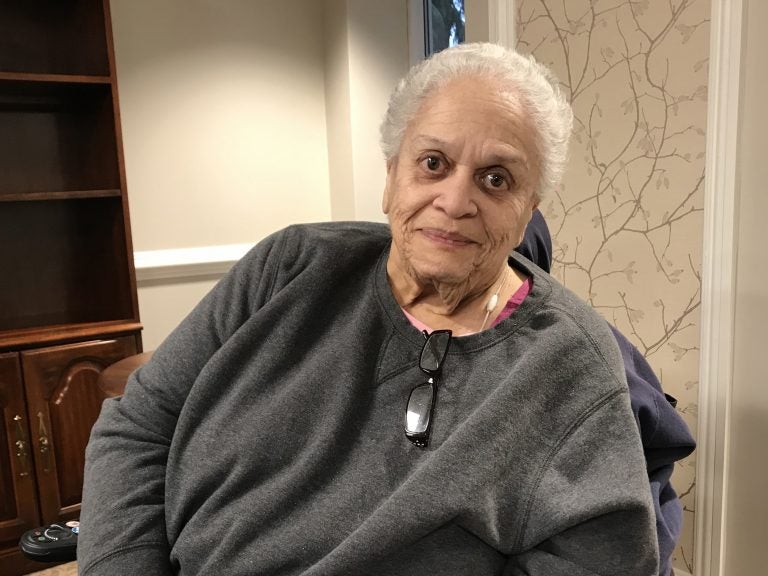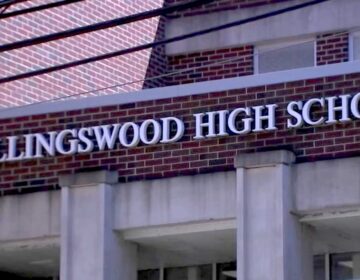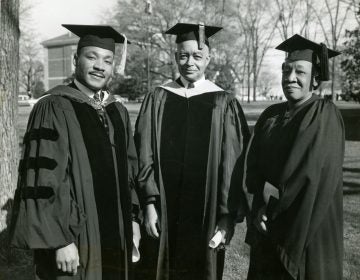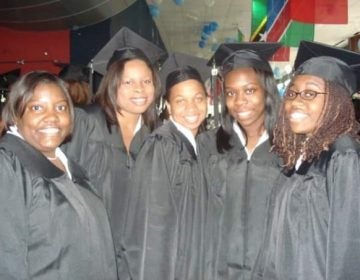‘Not on my watch:’ Spelman grad recalls helping civil rights sit-ins in Atlanta 60 years ago
Gwen Eagleson lived in the segregated South in the 1960s, which is when she listened to MLK speak and watched as her parents endured racial discrimination.
Listen 5:34
Gwen Eagleson is a Spelman College alumna who grew up in the segregated south. Her family befriended the Rev. Dr. Martin Luther King Jr. (Jennifer Lynn/WHYY)
Friday night, WHYY and NewCore invite you to interact with “Keep Moving from This Mountain,” a historic, yet still relevant, address Rev. Dr. Martin Luther King Jr. delivered to the students and faculty of Spelman College nearly 60 years ago. In this Founders Day speech, King identified four symbolic mountains: relativism, materialism, segregation, and violence that must be overcome if civilization is to survive.
At the time of the speech, Gwen Eagleson was a sophomore at Spelman, a traditionally Black liberal arts college for women in Atlanta. She grew up in the segregated South. In advance of her participation in tomorrow night’s event, Morning Edition host Jennifer Lynn met up with Eagleson at her home in Lansdale, to hear her story and what she thought of the speech.
Gwen Eagleson: To be honest with you, you all keep mentioning that speech. I have no clue what he said when he gave it! All I know is I was sitting there with my nice, little white dress on like everybody else was, and I was probably sitting in the back of Sisters Chapel because I was a sophomore. But I will not try to tell anybody that I can remember back [to] 1960. That is a long time ago. I’m 79 years old now. Trying to remember last week is quite a feat.
But you do have a memory of a role that you had. You were part of the student government, which at the time would be asked to help young people who participated in the sit-ins in Atlanta.
I was asked to stand on the corner and watch the police arrest the students. And when students were arrested, I was to go and call our attorney, [Donald] Hollowell, and have him go and make sure students didn’t get misplaced, so to speak.
And Donald Hallowell was an Atlanta civil rights attorney then, and he went on to free Dr. King from prison. So these civil disobedience protesters were not going to go missing through the criminal justice system, not on your watch.
I want no, not my watch. Look, I was a very small cog in the wheel, very small. In fact, I probably could have fallen off and you wouldn’t have known it. But anyway, I did stand there on the corner acting like I was interested in what was happening and appalled that the police were doing what they were doing. And then when nobody was looking at me, then I’d go make my phone call.
You have a unique experience that you lived in the neighborhood that Martin Luther King lived in with his family when he moved from Alabama to Atlanta.
He lived down the street. My parents knew his parents, his sister and my father were at Spelman. My father was on staff at Spelman. And his sister was a speech pathologist at Spelman.
Did you and your parents talk about events that happened to Black people in the segregated South around you?
I think that if you sat around and discussed painful things, you must be planning to do something about them. And at a very young age, my parents were not planning to do anything about it because they didn’t know what to do. One of the things I was curious about was why my father never went downtown with us.
Are you willing to share a bit of that story?
Why not? Both of them passed. My mother was very light. As you can see, so am I. My father was more of a brown, like a mahogany. They were a young married couple, and I was the baby, and she was holding me. I’m sorry, he was. And they were walking to their car, downtown Atlanta. Some young white guys decided they wanted to intimidate him, and they began to call him all kinds of names and wanted to know why he was with this white girl. He opened the door for her and she got in the car. He handed her me, and then she closed the door. He went around to get in the other side, and they were going around and were going to do something, I guess, to him. That was the feeling she got. So she rolled the window down and told them to leave the chauffeur alone. How else would she get home? Here she is talking about a man who received his Ph.D. when he was 25 years old. The second black man in the United States of America to get a Ph.D. in psychology, being her chauffeur. So that ended us going anywhere downtown Atlanta as a family.
You can join Gwen Eagleson and others for more conversation about the segregated South in the ’60s and a keynote address delivered to Spelman College students by the Reverend Dr. Martin Luther King Jr. back then. That event is tomorrow night at WHYY. More information on the event can be found by clicking here.
WHYY is your source for fact-based, in-depth journalism and information. As a nonprofit organization, we rely on financial support from readers like you. Please give today.





